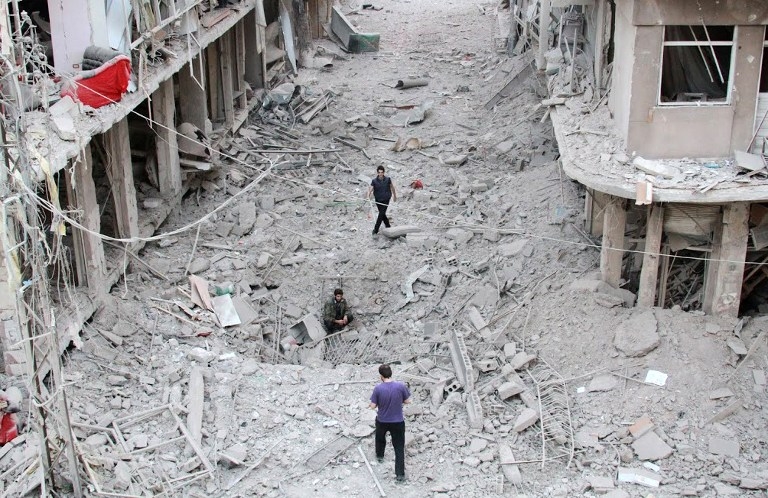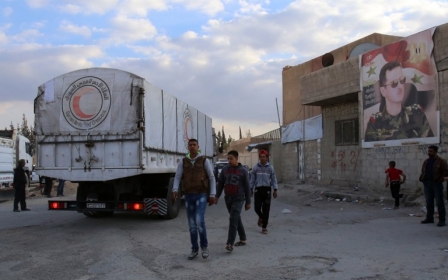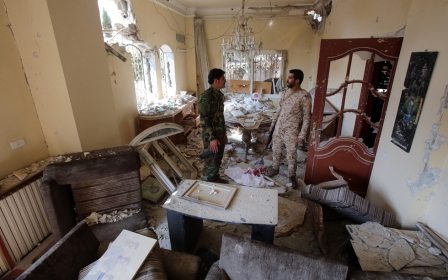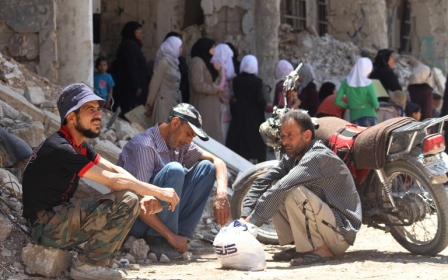Syria air drop plan appears to stall as first medical aid convoy reaches Daraya

Medical aid convoys entered the Syrian towns of Daraya and Moadamiyah on Wednesday as concerns grew that a plan to use air drops to get food and medicine to besieged towns in the country has stalled.
The arrival of medical supplies in Daraya, in a convoy organised by the UN, the International Committee of the Red Cross (ICRC) and the Syrian Red Crescent, came as the head of the Russian coordination centre in Syria said a 48-hour truce had been declared in the town to ensure that humanitarian aid is delivered to trapped civilians.
Rebel-held Daraya is only two miles from aid warehouses in the centre of Damascus, but the arrival of vaccines, nutritional items and baby milk - not food - on Wednesday was the first humanitarian aid to arrive since Syrian government forces besieged the town in November 2012.
About 8,000 people live in the town, just a 15 minute drive southwest of Damascus.
Despite intensifying appeals from its residents, the UN and rights groups, Syria's government has so far repeatedly refused to allow food aid into the town and last month turned away a convoy that had reached the town's outskirts, then shelled residents who had gathered to wait for the aid that never arrived.
"The last time, people were filling the streets waiting for the aid to come in," activist Shadi Matar told AFP from inside Daraya. "This time, there was no one. They were afraid the regime would shell them and they knew the convoy only held medical aid."
The arrival of aid comes more than a month after the International Syria Support Group (ISSG) said it would begin air drops on 1 June if President Bashar al-Assad’s government continued to block World Food Programme (WFP) aid and prevent land convoys from reaching besieged areas. The ISSG's 20 members, including the US, Britain and Russia, passed the decision unanimously.
At the time of the decision, the group highlighted the UN’s inability to provide any assistance to besieged areas including Daraya, Douma, East Harasta and Moadamiyah, but the joint statement on the deadline was hailed as a breakthrough by the British foreign secretary, Phillip Hammond.
Hammond said on 17 May that the decision was a "very important step forward, not only because it will save countless thousands of lives on the ground, but also potentially because it will save the political process".
It is unclear what impact the aid deliveries to Moadamiyeh and Daraya may have on American and British moves towards air drops, but Middle East Eye understands that the project is unlikely to go ahead in the short term because the UN decided the project is too dangerous without cooperation from Damascus and Moscow.
Bissan Fakih, a senior campaigner with the Syria Campaign, told MEE that she did not think air drops would commence this week. She said: “What we are seeing today is an attempt to get land convoys through. To move towards air drops, we need a strong statement from the UN and the US.”
The arrival of aid comes a day after Gareth Bayley, the UK special representative to Syria, condemned “continued obstruction and withholding of humanitarian aid in Syria” by the Damascus government.
He said: “Air drops to deliver aid to all designated besieged areas remains a last resort. It is an expensive and complex way to deliver aid. But it is vital that we fulfil this commitment. The UK stands ready to do so.”
Chris Doyle, the director of Council for Arab-British Understanding, which has campaigned for urgent aid drops, told MEE that Bayley’s comments reflected “his frustration” with the “failure of the international community to live up to its promises” and failure on Russia’s part to put pressure on Assad - but not a sign that the drops are imminent.
“We must remember the aid drops are an admission of failure as the regime in Damascus should be adhering to international law and allowing overground aid convoys across the county," Doyle said.
"But if we are going to promise to [carry out] air drops, having already failed to lift the sieges, then we should at least deliver them. We have yet again got ourselves into a situation where the international community cannot live up to its commitments.”
Air drops are a tactic of last resort in humanitarian disasters as they are fraught with practical problems, though campaigners say they are the only viable option in some areas of Syria and some air drops have been carried out, mainly in Deir er-Zor with Russian support.
Aid agencies also fear that air drops released from high altitude will either miss their targets or be seized by Syrian government forces, while exposing aircraft to risks of attack by the Syrian military.
However, there was fresh hope on Wednesday as Lieutenant General Sergei Kuralenko, head of the Russian coordination centre, announced the ceasefire.
He said: “On the initiative of Russia and in agreement with the leadership of Syria and the American side, a 'regime of silence' has been introduced for 48 hours on June 1, 2016, from 00:01am in the settlement of Daraya to ensure the safe delivery of humanitarian aid to the population,” Lieutenant General Sergei Kuralenko said.
Despite the announcement of Wednesday’s ceasefire, critics say experience has shown that the Syrian government may refuse to provide authority for air drops to cities that it has under siege.
Meanwhile, on Wednesday a top official at Doctors Without Borders (MSF) told the Guardian that the targeting of hospitals and humanitarian workers in Syria and Iraq is becoming a “new normal”.
Michiel Hofman, a senior specialist at the charity, described the fighting in Syria as a “dirty war,” saying both sides have targeted hospitals, while focusing most of his attention on the air forces operating in the region.
Also on Wednesday, France and Britain urged the United Nations to begin humanitarian aid airdrops in Syria ahead of a Security Council meeting called to discuss the crisis in besieged areas.
The call for action came despite land deliveries of aid supplies to two towns besieged by Syrian government forces where civilians are facing food shortages.
“When we talk about the bombing of hospitals, bombing means air forces,” he said. “Rebel groups don’t have air forces, so this is exclusively states that by definition have much larger firepower.”
On Monday night, the national hospital in the opposition-held Idlib city was put out of service when multiple air strikes hit the area, killing at least two dozen civilians in the latest attack on health services in the conflict.
The Syrian Observatory for Human Rights said that on Wednesday, government air strikes killed a further 15 civilians in Idlib province, while Russian and government air strikes killed at least 11 civilians in neighbouring Aleppo province. All told, at least 42 civilians died in northern Syria from air strikes conducted by the government, Russia and the US-coalition.
Middle East Eye propose une couverture et une analyse indépendantes et incomparables du Moyen-Orient, de l’Afrique du Nord et d’autres régions du monde. Pour en savoir plus sur la reprise de ce contenu et les frais qui s’appliquent, veuillez remplir ce formulaire [en anglais]. Pour en savoir plus sur MEE, cliquez ici [en anglais].




